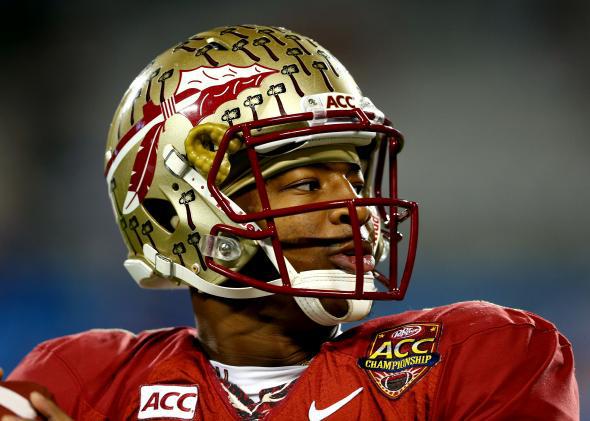The woman who accused Florida State University star quarterback Jameis Winston of rape isn’t going away, despite last week’s announcement from prosecutors that Winston will not be charged. The woman’s lawyer, Patricia Carroll, gave a scathing press conference Friday accusing the Tallahassee police of mishandling the case—and calling on the Florida attorney general to conduct an independent investigation.
Carroll is right that the police botched the investigation from the start. And I’m impressed with the tenacity of her client, who is a student at FSU. The allegations she made have already cost her—she has had to withdraw from classes amid a torrent of criticism, while Winston keeps winning on the field and is a top candidate for the Heisman Trophy. The problem is that the mistakes the police made at the outset, plus what looks like some fumbling by the state attorney’s office, will be hard for the attorney general to fix now.
Here’s a good compilation in the Tampa Bay Times of what the police failed to do after a friend of the accuser’s called 911 in the early hours of December 7 of last year, after the woman either had sex consensually with Winston (his version) or was assaulted by him (hers). They didn’t ask for his DNA. They didn’t try to get Winston’s phone records or his social media postings. They didn’t interview anyone at the bar where she said she had been drinking, or ask for surveillance footage—which existed, but was taped over automatically after a month. They didn’t look for the cab driver, who, according to the accuser, took her, Winston, and another man to his room. They didn’t look for Winston’s friends, who the woman said saw what happened in his room, even though one of them was identified as an FSU player named Chris and was obviously Chris Casher.
After Winston’s lawyer talked to him first, Casher gave a statement backing up Winston last November; the same is true of a second teammate, Ronald Darby. Carroll says there are inconsistencies in what Casher told the police—including the fact that he said at one point, but not in the statement the police released, that he videotaped part of the sexual encounter, but then erased his phone (another piece of evidence that sounds like it was lost). An assistant state attorney said of Casher and Darby, “I have concerns about their credibility.”
This is a hard case. Acquaintance rape accusations are often hard to prove, for all the familiar, he said/she said reasons. But the police made this one much harder to prove or disprove than it would have been if they pursued it with rigor from the start. Were they protecting Winston, or just bumbling when they didn’t go after evidence, most of which now cannot be reconstructed? That’s another question that’s very hard to answer.
